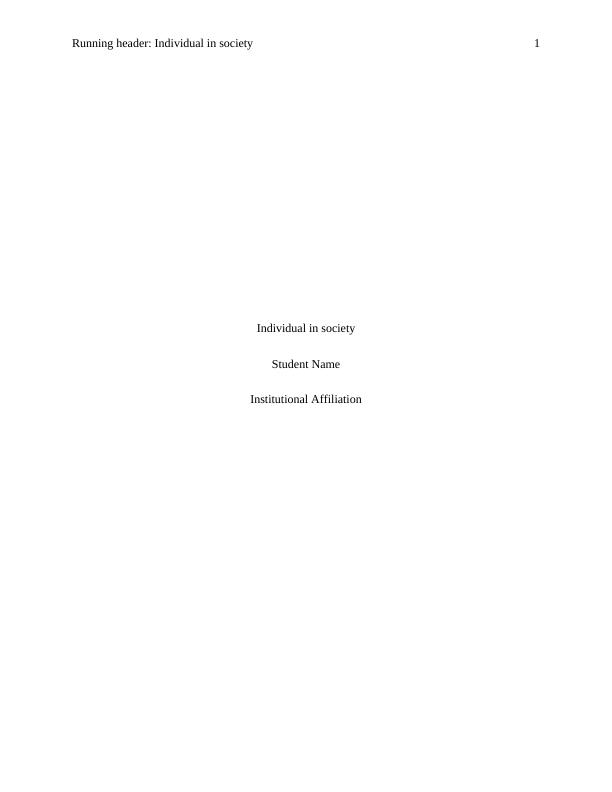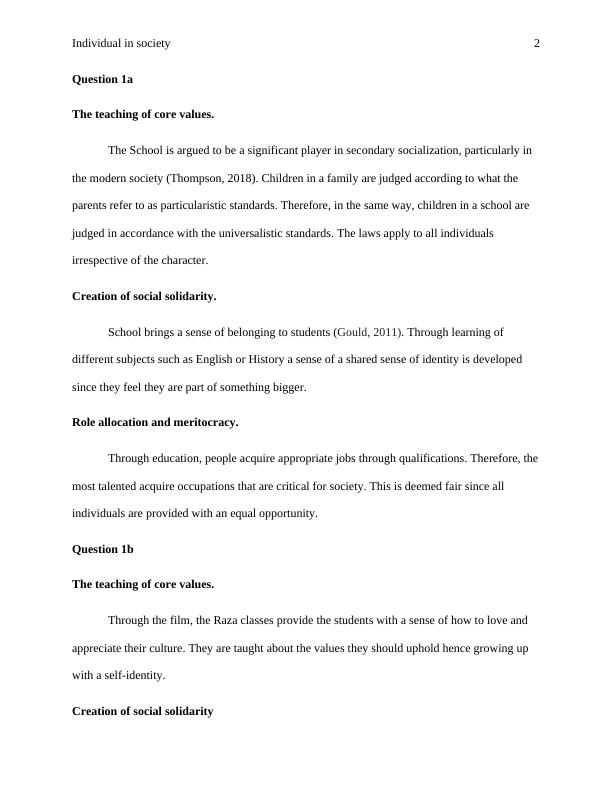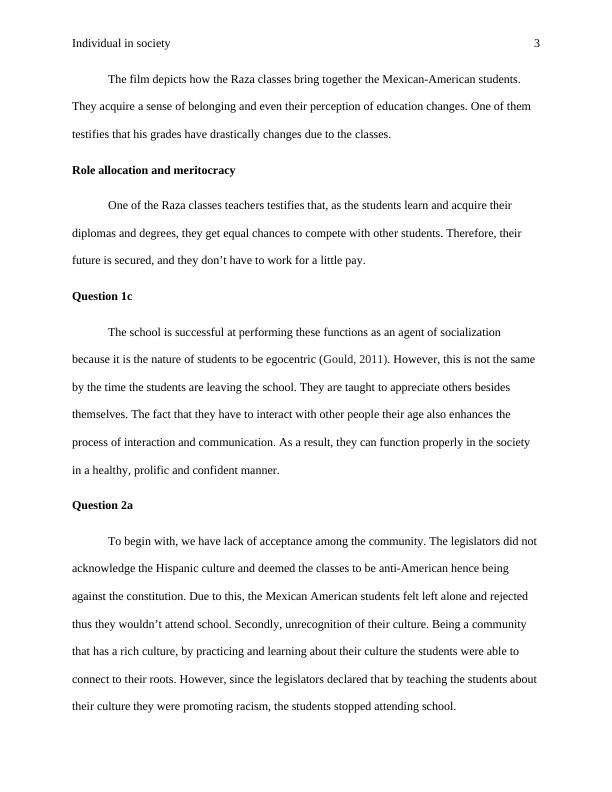Individual in Society: School as an Agent of Socialization
Added on 2023-06-10
6 Pages1107 Words432 Views
Running header: Individual in society 1
Individual in society
Student Name
Institutional Affiliation
Individual in society
Student Name
Institutional Affiliation

Individual in society 2
Question 1a
The teaching of core values.
The School is argued to be a significant player in secondary socialization, particularly in
the modern society (Thompson, 2018). Children in a family are judged according to what the
parents refer to as particularistic standards. Therefore, in the same way, children in a school are
judged in accordance with the universalistic standards. The laws apply to all individuals
irrespective of the character.
Creation of social solidarity.
School brings a sense of belonging to students (Gould, 2011). Through learning of
different subjects such as English or History a sense of a shared sense of identity is developed
since they feel they are part of something bigger.
Role allocation and meritocracy.
Through education, people acquire appropriate jobs through qualifications. Therefore, the
most talented acquire occupations that are critical for society. This is deemed fair since all
individuals are provided with an equal opportunity.
Question 1b
The teaching of core values.
Through the film, the Raza classes provide the students with a sense of how to love and
appreciate their culture. They are taught about the values they should uphold hence growing up
with a self-identity.
Creation of social solidarity
Question 1a
The teaching of core values.
The School is argued to be a significant player in secondary socialization, particularly in
the modern society (Thompson, 2018). Children in a family are judged according to what the
parents refer to as particularistic standards. Therefore, in the same way, children in a school are
judged in accordance with the universalistic standards. The laws apply to all individuals
irrespective of the character.
Creation of social solidarity.
School brings a sense of belonging to students (Gould, 2011). Through learning of
different subjects such as English or History a sense of a shared sense of identity is developed
since they feel they are part of something bigger.
Role allocation and meritocracy.
Through education, people acquire appropriate jobs through qualifications. Therefore, the
most talented acquire occupations that are critical for society. This is deemed fair since all
individuals are provided with an equal opportunity.
Question 1b
The teaching of core values.
Through the film, the Raza classes provide the students with a sense of how to love and
appreciate their culture. They are taught about the values they should uphold hence growing up
with a self-identity.
Creation of social solidarity

Individual in society 3
The film depicts how the Raza classes bring together the Mexican-American students.
They acquire a sense of belonging and even their perception of education changes. One of them
testifies that his grades have drastically changes due to the classes.
Role allocation and meritocracy
One of the Raza classes teachers testifies that, as the students learn and acquire their
diplomas and degrees, they get equal chances to compete with other students. Therefore, their
future is secured, and they don’t have to work for a little pay.
Question 1c
The school is successful at performing these functions as an agent of socialization
because it is the nature of students to be egocentric (Gould, 2011). However, this is not the same
by the time the students are leaving the school. They are taught to appreciate others besides
themselves. The fact that they have to interact with other people their age also enhances the
process of interaction and communication. As a result, they can function properly in the society
in a healthy, prolific and confident manner.
Question 2a
To begin with, we have lack of acceptance among the community. The legislators did not
acknowledge the Hispanic culture and deemed the classes to be anti-American hence being
against the constitution. Due to this, the Mexican American students felt left alone and rejected
thus they wouldn’t attend school. Secondly, unrecognition of their culture. Being a community
that has a rich culture, by practicing and learning about their culture the students were able to
connect to their roots. However, since the legislators declared that by teaching the students about
their culture they were promoting racism, the students stopped attending school.
The film depicts how the Raza classes bring together the Mexican-American students.
They acquire a sense of belonging and even their perception of education changes. One of them
testifies that his grades have drastically changes due to the classes.
Role allocation and meritocracy
One of the Raza classes teachers testifies that, as the students learn and acquire their
diplomas and degrees, they get equal chances to compete with other students. Therefore, their
future is secured, and they don’t have to work for a little pay.
Question 1c
The school is successful at performing these functions as an agent of socialization
because it is the nature of students to be egocentric (Gould, 2011). However, this is not the same
by the time the students are leaving the school. They are taught to appreciate others besides
themselves. The fact that they have to interact with other people their age also enhances the
process of interaction and communication. As a result, they can function properly in the society
in a healthy, prolific and confident manner.
Question 2a
To begin with, we have lack of acceptance among the community. The legislators did not
acknowledge the Hispanic culture and deemed the classes to be anti-American hence being
against the constitution. Due to this, the Mexican American students felt left alone and rejected
thus they wouldn’t attend school. Secondly, unrecognition of their culture. Being a community
that has a rich culture, by practicing and learning about their culture the students were able to
connect to their roots. However, since the legislators declared that by teaching the students about
their culture they were promoting racism, the students stopped attending school.

End of preview
Want to access all the pages? Upload your documents or become a member.
